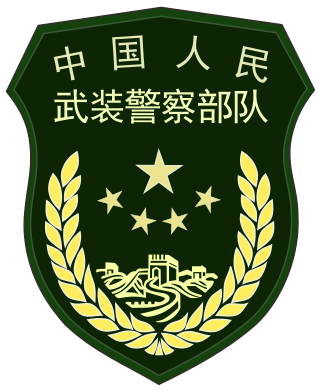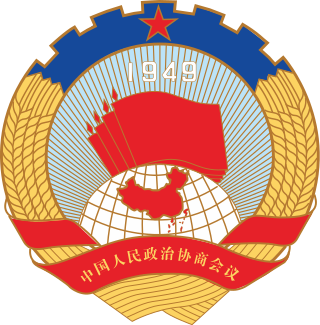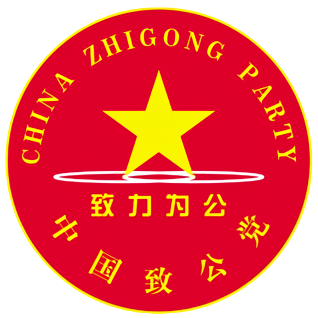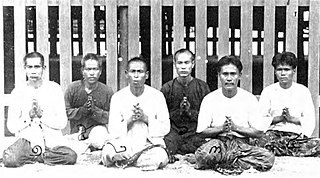
China, officially the People's Republic of China, is a country in East Asia. With a population exceeding 1.4 billion, it is the world's second-most populous country after India. China spans the equivalent of five time zones and borders fourteen countries by land. With an area of nearly 9.6 million square kilometers (3,700,000 sq mi), it is the third-largest country by total land area. The country is divided into 33 province-level divisions: 22 provinces, five autonomous regions, four municipalities, and two semi-autonomous special administrative regions. Beijing is the national capital, while Shanghai is its most populous city by urban area and largest financial center along with Chongqing as the largest city proper in the world.
In China, politics functions within a communist state framework based on the system of people's congress under the leadership of the Chinese Communist Party (CCP), with the National People's Congress (NPC) functioning as the highest organ of state power and only branch of government per the principle of unified power. The CCP leads state activities by holding two-thirds of the seats in the NPC, and these party members are, in accordance with democratic centralism, responsible for implementing the policies adopted by the CCP Central Committee and the National Congress. The NPC has unlimited state power bar the limitations it sets on itself. By controlling the NPC, the CCP has complete state power. China's two special administrative regions (SARs), Hong Kong and Macau, are nominally autonomous from this system.

The member states of the United Nations comprise 193 sovereign states. The United Nations (UN) is the world's largest intergovernmental organization. All members have equal representation in the UN General Assembly.

The State Council of the People's Republic of China, also known as the Central People's Government, is the chief administrative authority and the national cabinet of China. It is constitutionally the highest administrative organ of the country and the executive organ of the National People's Congress, the highest organ of state power. It is composed of the premier, vice premiers, state councilors, ministers of ministries, directors of committees, the auditor general, and the secretary-general.
Freedom of the press or freedom of the media is the fundamental principle that communication and expression through various media, including printed and electronic media, especially published materials, should be considered a right to be exercised freely. Such freedom implies the absence of interference from an overreaching state; its preservation may be sought through the constitution or other legal protection and security. It is in opposition to paid press, where communities, police organizations, and governments are paid for their copyrights.

The People's Armed Police Force is a Chinese paramilitary organization primarily responsible for internal security, riot control, counter-terrorism, disaster response, law enforcement and maritime rights protection as well as providing support to the People's Liberation Army (PLA) during wartime.

The Central Military Commission (CMC) is the highest national defense organization in the People's Republic of China, which heads the People's Liberation Army (PLA), the People's Armed Police (PAP), and the Militia of China.

The Chinese People's Political Consultative Conference (CPPCC) is a political advisory body in the People's Republic of China and a central part of the Chinese Communist Party (CCP)'s united front system. Its members advise and put proposals for political and social issues to government bodies. However, the CPPCC is a body without real legislative power. While consultation does take place, it is supervised and directed by the CCP.
China is one of the members of the United Nations and is one of five permanent members of its Security Council. One of the victorious Allies of World War II, the Republic of China (ROC) joined the UN upon its founding in 1945. The subsequent resumption of the Chinese Civil War between the government of Republic of China and the rebel forces of the Chinese Communist Party, led to the latter's victory on the mainland and the establishment of the People's Republic of China (PRC) in 1949. Nearly all of Mainland China was soon under its control and the ROC government retreated to the island of Taiwan.

The United Front Work Department (UFWD) is a department of the Central Committee of the Chinese Communist Party (CCP) tasked with "united front work." It gathers intelligence on, manages relations with, and attempts to gain influence over elite individuals and organizations inside and outside mainland China, including in Hong Kong, Taiwan, and in other countries.
Elections in the People's Republic of China occur under a one-party authoritarian political system controlled by the Chinese Communist Party (CCP). Direct elections, except in the special administrative regions of Hong Kong and Macau, occur only at the local level people's congresses and village committees, with all candidate nominations preapproved by the CCP. By law, all elections at all levels must adhere to the leadership of the CCP.
The United Nations General Assembly has granted observer status to international organizations, entities, and non-member states, to enable them to participate in the work of the United Nations General Assembly, though with limitations. The General Assembly determines the privileges it will grant to each observer, beyond those laid down in a 1986 Conference on treaties between states and international organizations. Exceptionally, the European Union (EU) was in 2011 granted the right to speak in debates, to submit proposals and amendments, the right of reply, to raise points of order and to circulate documents, etc. As of May 2011, the EU is the only international organization to hold these enhanced rights, which has been likened to the rights of full membership, short of the right to vote.

The China Zhi Gong Party is one of the eight minor political parties in the People's Republic of China under the direction of the Chinese Communist Party. It is the sixth-ranking minor party in China.

The government of the People's Republic of China is based on a system of people's congress within the parameters of a unitary communist state, in which the ruling Chinese Communist Party (CCP) enacts its policies through people's congresses. This system is based on the principle of unified state power, in which the legislature, the National People's Congress (NPC), is constitutionally enshrined as "the highest state organ of power." As China's political system has no separation of powers, there is only one branch of government which is represented by the legislature. The CCP through the NPC enacts unified leadership, which requires that all state organs, from the Supreme People's Court to the President of the People's Republic of China, are elected by, answerable to, and have no separate powers than those granted to them by the NPC. By law, all elections at all levels must adhere to the leadership of the CCP. The CCP controls appointments in all state bodies through a two-thirds majority in the NPC. The remaining seats are held by nominally independent delegates and eight minor political parties, which are non-oppositional and support the CCP. All government bodies and state-owned enterprises have internal CCP committees that lead the decision-making in these institutions.
The united front is a political strategy of the Chinese Communist Party (CCP) involving networks of groups and key individuals that are influenced or controlled by the CCP and used to advance its interests. It has historically been a popular front that has included eight legally-permitted political parties and people's organizations which have nominal representation in the National People's Congress and the Chinese People's Political Consultative Conference (CPPCC). Under CCP general secretary Xi Jinping, the united front and its targets of influence have expanded in size and scope.

Chengguan is an administrative practice of city-level local governments in China to oversee and manage city appearance and public environments according to the region's bylaws. Chengguan are non-sworn civil agencies and are not entitled police powers.
Abortion in China is legal at all stages of pregnancy and generally accessible nationwide. Abortions are available to most women through China's family planning program, public hospitals, private hospitals, and clinics nationwide. China was one of the first developing countries to permit abortion when the pregnant woman's health was at risk and make it easily accessible under these circumstances in the 1950s. Following the Chinese Communist Revolution and the proclamation of the People's Republic of China in 1949, the country has periodically switched between more restrictive abortion policies to more liberal abortion policies and reversals. Abortion regulations may vary depending on the rules of the province. In an effort to curb sex-selective abortion, Jiangxi and Guizhou restrict non-medically necessary abortions after 14 weeks of pregnancy, while throughout most of China elective abortions are legal after 14 weeks. Although sex-selective abortions are illegal nationwide, they were previously commonplace, leading to a sex-ratio imbalance in China which still exists.

The National People's Congress (NPC) is the highest organ of state power of the People's Republic of China. The NPC is the only branch of government in China, and per the principle of unified power, all state organs from the State Council to the Supreme People's Court (SPC) are subservient to it. With 2,977 members in 2023, it is the largest legislative body in the world. The NPC is elected for a term of five years. It holds annual sessions every spring, usually lasting from 10 to 14 days, in the Great Hall of the People on the west side of Tiananmen Square in Beijing.

A triad is a Chinese transnational organized crime syndicate based in Greater China with outposts in various countries having significant overseas Chinese populations.

The National Intelligence Law of the People's Republic of China governs China's intelligence and security apparatus. It is the first law made public in China which is related to China's national intelligence agencies. The law however does not specifically name any of the organizations to which it applies such as the Ministry of State Security (MSS) and Ministry of Public Security (MPS). According to the law, "everyone is responsible for state security" which is in line with China's state security legal structure as a whole. The final draft of the law on 16 May 2017 was toned down as compared to previous versions. The National People's Congress passed the law on 27 June 2017. The law was updated on 27 April 2018.










